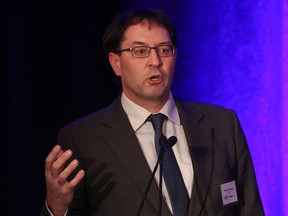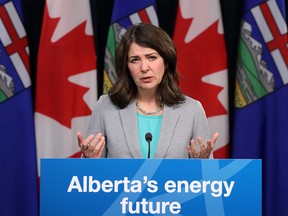
Premier Danielle Smith was in a vehicle on Wednesday evening heading down a seven-lane highway in Dubai for a dinner with Alberta Environment Minister Rebecca Schulz and other Canadian policymakers.
The event was being hosted by federal Environment Minister Steven Guilbeault, whom the premier has previously called a “maverick” and “renegade.”
The dinner with about 24 other Canadian politicians and officials, on the sidelines of the COP28 climate summit this week, occurred on the eve of an announcement from Guilbeault of Ottawa’s controversial emissions cap for the country’s oil and gas sector — and a showdown between the feds and the province.
“I saw him briefly (this week) and said hello, and he’s hosting a dinner this evening,” Smith said in an interview shortly before the event, which also included Saskatchewan Premier Scott Moe.
“I’m very disappointed that he came here clearly with an agenda to unilaterally announce major reductions in emissions that we see will be production caps.”
The framework for the emissions limit on the oil and gas industry, which will require the sector to cap and then cut them, will be released Thursday. It will use a cap-and-trade regime, according to federal sources.
It’s sure to lead to a nasty tussle between Alberta and the Trudeau government, although both sides have adopted a target of net-zero emissions by 2050.
The oil industry is the largest emitting sector in the country. The Canadian government has vowed to cut overall emissions in the country by 40 to 45 per cent by 2030.
Its emissions reduction plan last year modelled a 42 per cent cut from the oil and gas industry (from 2019 levels) by the end of the decade.
Alberta sees the cap as unconstitutional, as provinces can exclusively make laws related to the exploration and development of non-renewable natural resources.
“I hear that he’s intending to announce an emissions cap, which we see as a production cap on oil and gas . . . It’s a pretty outrageous thing to do, to come to a conference like this without having shared the details with us,” Smith said before heading into the dinner.
“I’ll be polite, as I always try to be, but I have to be firm, that they have continued to violate our jurisdiction, they lose in court and then they act as if they can operate outside the law.”
-
 Oil and gas emissions cap coming Thursday, targets 2026 start date
Oil and gas emissions cap coming Thursday, targets 2026 start date -
 Varcoe: A ‘nastier fight’ — Here comes the emissions cap and a high-stakes federal-provincial donnybrook
Varcoe: A ‘nastier fight’ — Here comes the emissions cap and a high-stakes federal-provincial donnybrook -
 New proposed methane emission targets draw pushback from Alberta government
New proposed methane emission targets draw pushback from Alberta government -
 COP28’s burning question: should fossil fuels be phased out or phased down?
COP28’s burning question: should fossil fuels be phased out or phased down?
Federal sources said that 42 per cent will not be the final number for emissions cuts by 2030, and stressed the framework will be technically achievable with some flexibility mechanisms put in place for industry.
“We have made sure it is a cap on pollution, not on production,” said one source.
The federal government examined two possible options last year for the policy, but has decided to use a cap-and-trade system, the sources confirmed. Such a process would likely set a hard limit on industry emissions, establishing a total quota of allowable emissions, which would fall over time.
Once a baseline amount of emissions is set, companies will be able to acquire offset credits — and Ottawa will also create a decarbonization fund — to ensure predictable cuts.
Despite talk of further consultation with the sector as the regulations are developed, the oil and gas industry is frustrated by the move. The sector also faces a rising national carbon price, clean fuel standards and new rules to cut methane emissions.
“We strongly oppose an emissions cap and it is unnecessary to meet Canada’s Paris commitments,” Tristan Goodman, head of the Explorers and Producers Association of Canada, said Wednesday.
“It is simply a punitive approach, not in line with other countries.”
The president of one of Canada’s largest drilling firms blasted the idea of a cap, saying it will push industry investment into other countries.
“It will put thousands of Albertans out of work, and a cap on production is nothing short of the NEP (National Energy Program) all over again,” Ensign Energy Services president Bob Geddes said Tuesday night.
“It’s the single-biggest existential threat (to the sector). An emissions cap is a cap on production. It’s as simple as that.”

Industry leaders are worried about the effect of the emissions cap, as Canada is the fourth-largest oil producer in the world, but the only major exporter facing such a measure.
However, there is also growing pressure for the entire fossil fuel sector to cut emissions quickly as concerns over climate change grow. One debate taking place at COP28 focuses on a push to phase out fossil fuels, while some countries are advocating for a less aggressive “phase down” over time.
Smith said she is confident the industry can meet its decarbonization objectives by 2050. By setting a shorter 2030 time frame, there’s a risk that technology “doesn’t materialize in seven years” and production would be shut in.
Her government will take steps to ensure that doesn’t happen and is prepared to use the Alberta Sovereignty Within a United Canada Act in another energy confrontation with Ottawa.
“The Sovereignty Act motion is the way we would litigate it, because what we would say is this is what we’re doing instead. And it’ll be up to the federal government to take us to court if they think somehow they have a right to take away our constitutional authority,” Smith added.
“The Constitution matters, and if they don’t respect it they are going to create a national unity crisis.”

The International Energy Agency forecasts that demand for oil and gas will peak later this decade. Yet, there are questions about meeting the growing global appetite for oil in the short term and if the cap will push production — and carbon emissions — into other producing countries.
Total Canadian oil production is expected to rise by more than 300,000 barrels per day next year, topping 5.4 million barrels, said Kevin Birn, a vice-president with S&P Global Commodity Insights.
Birn said if the perception is the emissions cap is too steep or unachievable, it could affect the flow of investment into Canada. But specific details of the initiative will determine how it affects the industry.
“If the policy sets expectations that are too stringent or too inflexible, then it has the potential to negatively impact capital flows,” Birn said.
“The risk here is that we undermine the ability to finance the very projects that we want to bring forward to decarbonize, to improve the (industry) competitiveness.”
Chris Varcoe is a Calgary Herald columnist.
You can read more of the news on source




